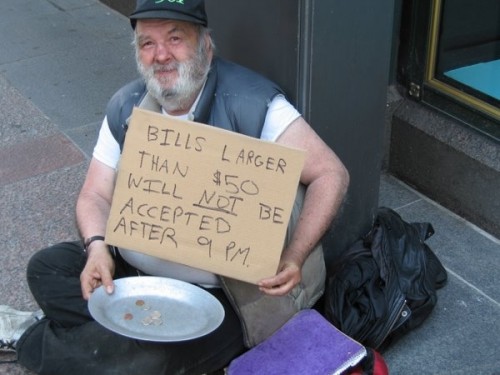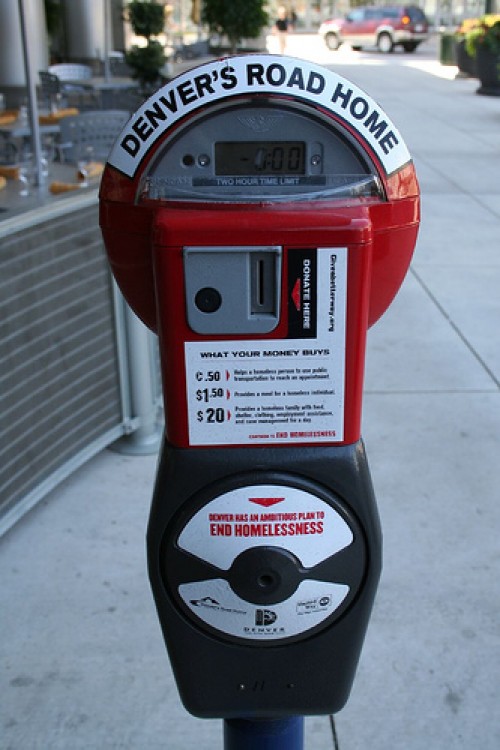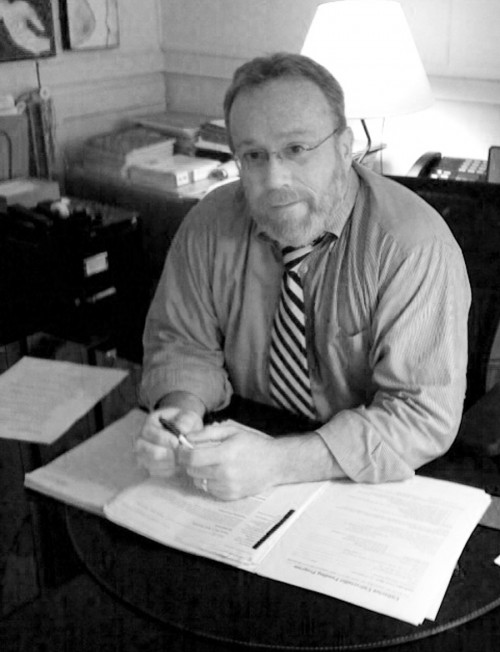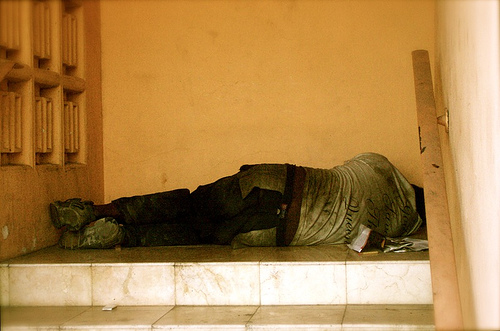Miami Unveils New Plan for Panhandlers
What do you do when you’re out and about on Washington Avenue or Lincoln Road, and a bedraggled stranger engages you in his tale of woe, requesting change? Do you happily dole it over? Or are you sometimes a little skeptical about where it’s going and how truthful his story is? Do visions of redlight rustlers earning 6 figure incomes dance in your head? If you’ve wondered how to truly help that person—without enabling them—one local group has a solution. BUDDY, CAN YOU SPARE A CARD?
Ron Book, chairman of the Miami-Dade Homeless Trust, announced Thursday at a press conference that instead of handing cash out to area panhandlers, residents should hand out a business card instead, containing the number of a hotline those in crisis can call to find food, shelter, and other services. “Instead of giving money to people on the street, give it to the Trust,” he said, assuring the audience that 100% of the funds they receive will go toward helping the homeless. “Most people don’t know that all homeless people don’t panhandle,” he explained, “and all panhandlers aren’t homeless.” So how exactly do you give to the Trust? Book had the solution to that, too. SUPERMETERS
(above) Meters like this one from Denver, CO provide an alternative way to help the homeless He unveiled two containers—one a six foot pyramid-shaped device, and another smaller one resembling a parking meter. Both were fashioned by renowned artist Romero Britto and painted bright yellow with floral designs on them. Book explained that the goal was to place these meters in area malls, office buildings and other businesses, where they would be sponsored by the business, at a rate of $1200 for the larger pyramid-shaped container, and $1000 for the smaller parking meter-type device. WILL IT WORK?
(above) Neil Donovan Neil Donovan, executive director of the National Coalition for the Homeless, is skeptical. In comments appearing in a recent article in the Miami Herald, he insists that similar programs launched in other cities around the country have been unsuccessful in that they don’t stop panhandlers from asking for money. “Homeless people are our neighbors, our brothers and sisters,” he contended, “and we should consider them one of us instead of a distinct group that should be treated separately.’’ He added that giving to someone who needs it should be a personal decision. In Miami Beach, the Overboard Panhandling Ordinance prohibited the solicitation of money, either passively or aggressively, but unfortunately, until recently, the loosely-worded regulation also outlawed Salvation Army volunteers, Girl Scouts selling cookies and street entertainers. Citing a violation of free speech guarantees, the ACLU successfully sued the city in 2005. The City revamped the law in 2007, allocating specific zones in which street entertainment was permitted, and the ACLU sued again. Despite the ordinance, panhandling remains a common practice in Miami Beach today. Whether The Miami-Dade Homeless Trust’s campaign will be successful or not will depend on large part on the enthusiasm of local businesses and residents, whose own pockets are running low as a result of the current economic troubles, making charitable donations on their part all the more difficult. However, lest we look too dismissively at that fellow asking for a quarter, it’s useful to remember that most of us are only a paycheck or two away from being in his shoes.
You Deserve More Than an Ordinary Vacation.
Travel with Miami Beach 411 Today!
The Miami Beach 411 Travel Store is Open 24/7.
14 Comments on"Miami Unveils New Plan for Panhandlers"
|

Like what you see? Let's talk about how
we can help your vacation --> Contact Us |
|
Like what you see? Let's talk about
how we can help your vacation
--> Contact Us
how we can help your vacation
--> Contact Us




















Maria de los Angeles says:
Thanks for bringing this to our attention here on 411, Doug. The site of homeless people on Washington Avenue is always heart breaking.
I wonder, does the cost of the special parking meter go back to the trust?
By the way, that’s my photo there on the bottom ... did you get it from the Flickr group?
Posted on 10/02/2009 at 11:49 AM